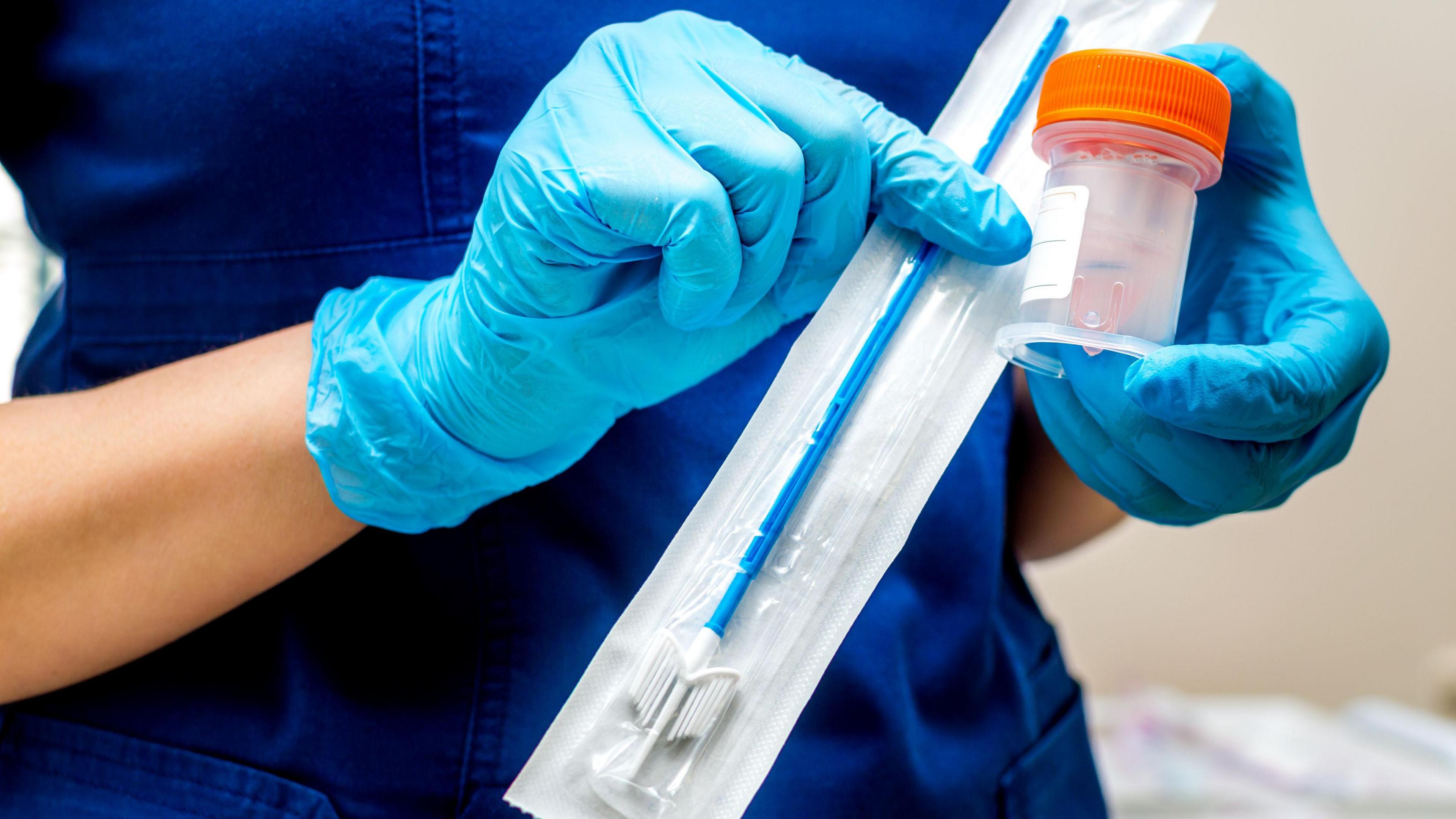No cervical cancer cases found in review to date

- Published
No cases of cervical cancer have been found to date in a major review of cervical screening in the Southern Health Trust.
In October 2023, BBC News NI revealed about 17,500 women in Northern Ireland were to have their smear tests re-checked in the review dating back to 2008.
The trust said the review is almost complete (99.54%), with about 80 women waiting on results being finalised.
The Cervical Cytology Review followed a highly critical report commissioned by the Royal College of Pathologists (RCPath).
Initial findings showed about 300 women with some low-grade abnormalities.
Fewer than five have been found to have higher-grade abnormalities, according to the trust. However, the vast majority of previous smear results were unchanged.
Identifying high-grade abnormalities does not mean cancer has been found; these are pre-cancerous cell changes could progress to cancer if left unchecked or untreated.
The women who fall into this category have been referred for further investigation and management if required.
The 80 women whose results are being finalised include:
Those whose slides were unavailable or unsuitable for review due to deterioration or disposal.
A slide review finding that required a smear to be taken
Women who are pregnant or cannot have a smear due to a current health issue.
Those who require a repeat smear test based on a slide review outcome have been invited.
It is expected this work will be completed by the end of October, and the trust said it was unlikely to significantly vary the overall findings of the review.
A comprehensive outcomes report to detail the findings is expected to be completed in the autumn.
A campaign group set up after the review was announced had asked for a statutory public inquiry.
Ladies with letters, who represent some of the women affected, met Health Minister Mike Nesbitt on 3 September.
It will be up to the minister to decide what happens next, once the report has been published.
Trust 'mindful' of distress caused by review
The trust's medical director, Dr Stephen Austin, told BBC News NI the review has been a "significant undertaking", but added "for the vast majority of women, their original result did not change".
"However, I am very mindful of the distress this process has caused over recent months, and I apologise again to all those women affected," he said.
To avoid any conflict of interest, the Southern Health Trust laboratory did not participate in the review of cytology slides.
Dr Austin said the review, which was undertaken in Belfast, Western, and Northern Health Trust laboratories, was carried out in a "very comprehensive manner".
It was carried out in partnership with the Public Health Agency (PHA) to check the original result provided was correct.
Staff 'significantly underperforming'
Among the criticisms in the RCPath commissioned review were that several cytology staff were "significantly underperforming" and action taken by management was inadequate over many years.
Dr Austin said the underperformance of some of the trust's screeners between 2008 and 2021 was "identified, and actions were taken to deliver improvement".
He added, at times, the performance of some screeners did not reach the required standard despite having had additional training and support.
He said this was "not recognised," and the trust apologised for this.
17,500 cervical smear tests to be re-checked
- Published9 October 2023
Cervical screening review 'deeply regrettable'
- Published25 July 2024
In December 2023, Northern Ireland introduced primary HPV cervical screening.
It checks for an infection called human papillomavirus (HPV), the cause of most cervical cancers.
This newer HPV test is regarded as a better indicator than cytology of identifying who is at higher risk of developing cervical cancer.
Each year in Northern Ireland, about 80 women are diagnosed with cervical cancer and approximately 21 die, according to data from the NI Cancer Registry, external.
The data shows there is no significant variation in incidence, stage at diagnosis, or deaths from cervical cancer between Health and Social Care Trust areas.
Between 2019 and 2024, there have been 60 confirmed cases of cervical cancer in the Southern Health Trust area, which have been reviewed through the audit process.
The audit process covers the whole screening pathway, including previous screening tests.
All women diagnosed with invasive cervical cancer between 2019 and June 2024 have had a full cervical screening history review to identify learning to improve the screening programme.
The trust said meetings to discuss audit findings have taken place with those women who had learning identified in their audit outcome.
Out of the 60 cases, eight Serious Adverse Incidents (SAIs) are currently being reviewed.
SAIs are declared for events or circumstances that could have led to harm or damage, including loss of life.
If there is any crossover between these SAIs and the Cervical Cytology Review, the Trust says these will be referenced in the review's final outcomes report.
'Screening saves lives'
The Southern Health Trust and Public Health Agency (PHA) has continued to urge women to come forward for their routine smear tests as "cervical screening saves lives".
However, they have said it is important to emphasise again that cervical screening is not a diagnostic test.
It is for people without symptoms and aims to detect early changes that could go on to develop into cervical cancer if left untreated.
Anyone with symptoms should always seek advice from their GP.
- Published25 January 2024
